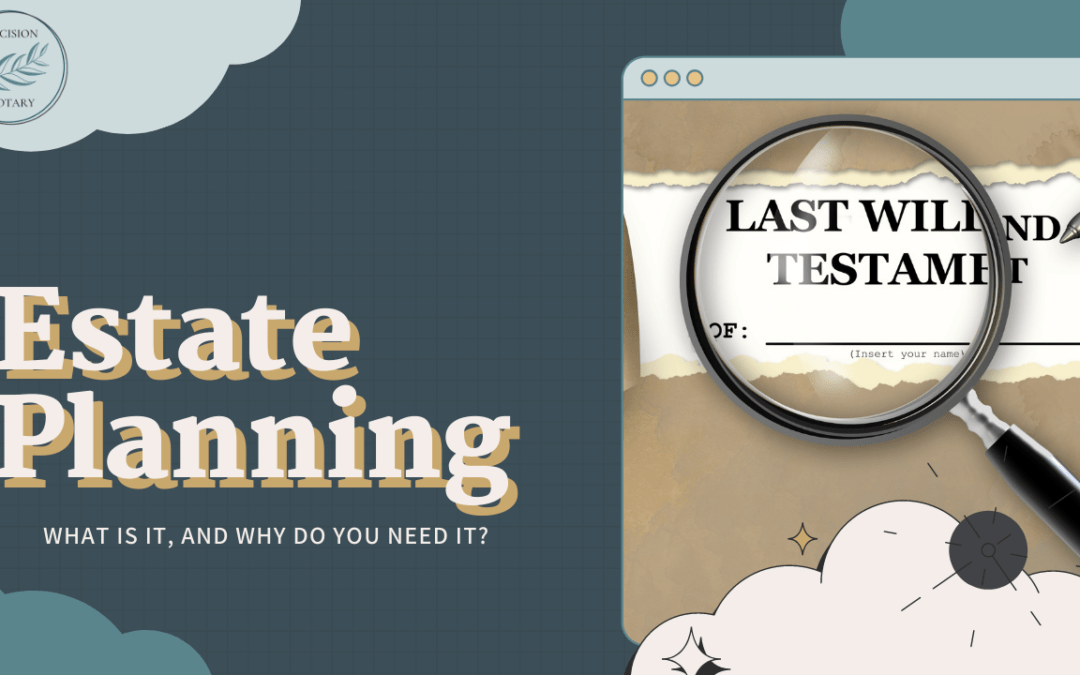I’m talking a little bit about estate planning today. I handle these types of documents frequently for my clients and sometimes people ask me about it, and while I can’t offer legal advice nor can I prepare documents on your behalf, I can share a little bit of general information, and hopefully it will be helpful to you.
So, first of all, what is estate planning?
Simply it’s the creation of a formal legal plan which can be implemented in the event of crisis, incapacity, or death.
Usually, it incorporates a number of different documents, I’ll discuss a few of the most common, this is not an all-inclusive list.
The first would be the Will or Last Will and Testament. This document allows you to detail your wishes for how you would like your property distributed after you die, you can also specify a guardian to provide care for any minor children to prevent them from being subject to court custody.
Next would be a Durable Power of Attorney and there may be more than one for different purposes, but this would
allow you to appoint a legal representative to make decisions on your behalf if you are either not able or not available. So, they could make financial decisions, life decisions, and sign documents on your behalf according to whatever is specified in the power of attorney; and this person acting on your behalf will become known as your agent or attorney in fact.
Another document we often see included in estate planning is a Healthcare Directive. This document allows you to specify your wishes for any end-of-life care. If you were to reach a point where you could no longer communicate your wishes or desires to your healthcare providers or your family having it written out in this plan enables your providers to proceed according to your wishes and alleviates the burden of making those decisions from your family. You can also appoint a medical power of attorney to make decisions on your behalf.
And finally, some people create what’s called a Revocable Living Trust to manage their assets. A person, or couple, can specify in the Trust how their property and assets should be handled after they die. Typically, the person creating the trust is the Trustee while they are alive, and they will have full control over their assets and can make changes to this Trust. They can also appoint a Successor Trustee which is somebody who will assume responsibility after the Trustee themselves dies.
Oftentimes the distribution of an estate is handled by the court in a process called probate which can be lengthy and expensive; having a Trust helps to minimize legal issues after a person passes because if they have all their assets in the Trust, they can be distributed accordingly without the probate process, so that’s why it’s a very attractive option for many people.
Why should you be concerned about estate planning?
Well, for most of us it just gives us peace of mind that we have our affairs in order, that you can have your wishes carried out after you’re gone, your property/assets can be given to whomever you specify, your children can be cared for by a person that you know and trust, and that you know you are reducing the burden from your loved ones after you’ve gone.
How do you go about getting all of this done – it can be kind of complicated?
My first recommendation would be to have an attorney draw up your documents for you to minimize any potential legal issues by having a professional handle them for you. If you need a recommendation for an attorney, I’d be happy to refer you to someone locally.
Some people are confident about doing it themselves and there are websites where you can find templates that allow you to drop in your information and create your own documents; if you’re comfortable with that method, that’s great, go for it.
After you have your documents drawn up you will need to sign them in front of a notary, feel free to call me and I’d be glad to come and help you with that.
Keep in mind that most of the time witnesses will be required for some of these documents and your witnesses should not be family members or anyone who has any beneficial interest in your estate or is named in any of the documents; friends co-workers, or neighbors might be a good choice.
Once you have your documents signed and notarized be sure to make extra copies, keep them in a secure location, and make sure your family knows where to retrieve them when the time comes that they are needed.
I hope that information has inspired you to take care of some of these important documents, if you have any questions feel free to reach out to me.
We had our documents prepared last year by our Legal Shield attorney and they made the process very simple for us, I am glad to have those done! LegalShield provides a great low-cost subscription that gives you access to a local attorney and includes the preparation of estate planning documents (with the exception of the trust – they can prepare this for you at a discounted rate).
If you’d like more information, please visit my website, or contact me directly.
Thanks for visiting!
Linda


Recent Comments